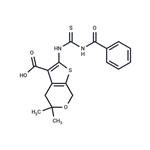The Ras family of GTPases, including the Arf, Rho, Ras, and Rab GTPase subfamilies, regulates various cellular processes ranging from membrane trafficking to the control of cell proliferation. They regulate cell physiology by switching between active and inactive conformational states by binding either GTP or GDP. Alterations in GTPase function are a known hallmark of certain cancers and genetic diseases. CID-1067700 is one of the first identified competitive inhibitors of nucleotide binding by Ras-related GTPases. It binds the nucleotide binding pocket of Rab7 with a Ki value of 13 nM, preventing BODIPY-linked GTP and GDP binding with EC50 values of 11.2 and 21 nM, respectively.
This compound acts as a novel GTPase inhibitor.
ChEBI: 2-[[benzamido(sulfanylidene)methyl]amino]-5,5-dimethyl-4,7-dihydrothieno[2,3-c]pyran-3-carboxylic acid is a thienopyran.
CID 1067700 is a potent and competitive inhibitor of Ras-related GTPases that potently binds to Rab7 nucleotide binding site.
Agola et al. (2012), A competitive nucleotide binding inhibitor: in vitro characterization of Rab7 GTPase inhibition; ACS Chem. Biol., 7 1095
Agola et al. (2015), Quantitative bead-based flow cytometry for assaying Rab7 GTPase interaction with the Rab-interacting lysosomal protein (RILP) effector protein; Methods Mol. Biol., 1298 331
Lam et al. (2016), Small Molecule Inhibition of Rab7 Impairs B Cell Switching and Plasma Cell Survival To Dampen the Autoantibody response in Murine Lupus; J. Immunol., 197 3792
Ghosh et al. (2020), ?-Coronaviruses Use Lysosomes for Egress Instead of the Biosynthetic Secretory Pathway; Cell, 183 1520
![CID-1067700,2-(3-benzoylthioureido)-5,5-diMethyl-5,7-dihydro-4H-thieno[2,3-c]pyran-3-carboxylic acid Structure](/CAS/GIF/314042-01-8.gif)
